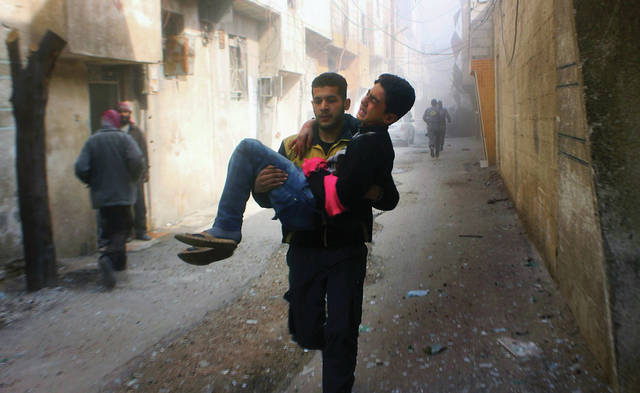BEIRUT — A new wave of airstrikes and shelling on eastern suburbs of the Syrian capital Damascus left at least 22 people dead and dozens wounded Saturday, raising the death toll of a week of bombing in the area to 500, as the U.N. Security Council unanimously approved a resolution demanding a 30-day cease-fire across Syria.
The weeklong bombardment has overwhelmed rescuers and doctors at makeshift hospitals, many of which have also been bombed. Activists say that terrified residents have been hiding in underground shelters where dozens of people can be crammed into small places.
The latest wave of bombings came after the U.N. Security Council delayed a vote on a resolution demanding a 30-day humanitarian cease-fire for two days to try to get Russia on board.
Russia’s U.N. Ambassador Vassily Nebenzia had repeatedly called an immediate cease-fire unrealistic.
In a bid to get Russian support, sponsors Kuwait and Sweden amended the draft resolution late Friday to drop a demand that the cease-fire take effect 72 hours after the resolution’s adoption.
After two hours of additional negotiations on Saturday, the Security Council unanimously approved a resolution demanding a 30-day cease-fire across Syria “without delay” to deliver humanitarian aid to millions and evacuate the critically ill and wounded.
“The U.N. convoys and evacuation teams are ready to go,” Sweden’s U.N. Ambassador Olof Skoog told the council just before the vote.
After the vote, many council members urged stepped up efforts to ensure a cease-fire and get assistance to millions in need.
Russia has been a main backer of Syrian President Bashar Assad since the country’s conflict began seven years ago. In 2015, Moscow joined the war on Assad’s side tipping the balance of power in his favor.
Syrian opposition activists say Russian warplanes are taking part in bombarding Damascus suburbs known as eastern Ghouta, where many people are hiding in underground shelters with little food and medical supplies amid a tight government siege.
“There is no electricity, no water, no flour, no bread and no baby formula,” said paramedic Siraj Mahmoud in an audio message calling for a short break in airstrikes so residents can get food for their children.
“There is nothing inside Ghouta.”



